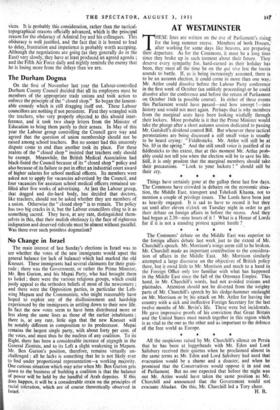AT WESTMINSTER
THESE lines are written on the eve of Parliament's rising! for the long summer recess. Members of both Houses.' after working for some days like beavers, are preparing their departure. As for the Commons, it must be a long time since they broke up in such torment about their future. They deserve every sympathy for; hard-earned as their holiday has been, they must all the time be on the qui vive lest the tocsin sounds to battle. If, as is being increasingly assumed, there is to be an autumn election, it could come in more than one way., Mr. Attlee could dissolve before the Labour Party conference in the first week of October (an unlikely proceeding) or he could dissolve after the conference and before the return of Parliament on October 16th (a possible course). In either of these events this Parliament would have passed—and how unwept !—into history and would not meet again. Perhaps that is why members from the marginal seats have been looking wistfully through their lockers. More probable is it that the Prime Minister would take the plunge after a short autumn session dedicated to passing Mr. Gaitskell's dividend control Bill. But whenever these tactical permutations are being discussed a still small voice is usually to be heard crying : " Fiddlesticks. Mr. Attlee will still be at No. 10 in the spring." And the still small voice is justified of its fiddlesticks to this extent, that at this moment Mr. Attlee prob- ably could not tell you when the election will be to save his life. Still, it is only prudent that the marginal members should take their precautions. " Look to your lockers ! " should still be their cry. * * * * Things have certainly gone at the gallop these last few days. The Commons have crowded in debates on the economic situa- tion, the Middle East, transport and Tshekedi Khama, not to mention a couple of privilege issues. The Lords have been just as heavily engaged. It is sad to have to record it but they sat until after eleven o'clock on Tuesday night in order to get their debate on foreign affairs in before the recess. And they had begun at 2.30—nine hours of it ! What is a House of Lords for if it is not a standing protest against hustle ? _ * * * * The Commons' debate on the Middle East was superior to' the foreign affairs debate last week just to the extent of Mr. Churchill's speech. Mr. Morrison's wings seem still to be broken. Mr. Churchill made an important contribution to the considera- tion of 'affairs in the Middle East. Mr. Morrison similarly attempted a large discourse on the objectives of British policy there, but it owed little to Mr. Morrison and much to a hand in the Foreign Office only too familiar with what has happened in the Middle East since the fall of the Ottoman Empire. This hand, in Mr. Churchill's words, had not avoided truisms and platitudes. Attention should not be diverted from the weighty parts of Mr. Churchill's speech by his sledge-hammer onslaught on Mr. Morrison or by his attack on Mr. Attlee for leaving the country with a sick and ineffective Foreign Secretary for the last twelve months of Mr. Bevin's life. These were but incidentals. He gave impressive proofs of his conviction that Great Britain and the United States must march together in this region which is as vital to the one as the other and as important to the defence of the free world as Europe.
* * * * All the suspicions raised by Mr. Churchill's silence on Persia that he has been at loggerheads with Mr. Eden and Lord Salisbury received their quietus when he proclaimed almost in the same terms as Mr. Eden and Lord Salisbury had used that evacuation would be a shame and a disaster, and when he promised that the Conservatives would oppose it in and out of Parliament. But no one expected that before the night was out Mr. Attlee would have taken the same position as Mr. Churchill and announced that the Government would not evacuate Abadan. On this, Mr. Churchill led a Tory cheer.
IL B.






























 Previous page
Previous page